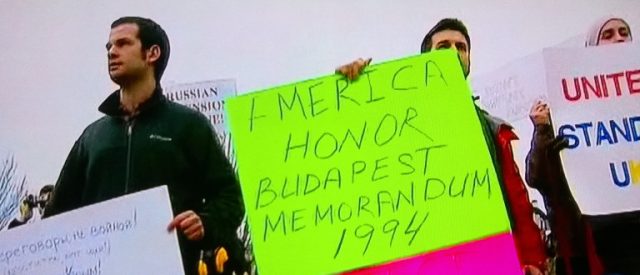In his Op-Ed article in the Kyiv Post of Jan. 12, 2017, Mr. Josh Cohen aptly observes that the US and the United Kingdom assert that as signatories to the Budapest Memorandum, their countries fulfilled their “legal” obligations by their diplomatically minimalistic genuflection to a literal interpretation of that international agreement signed in 1994 and thus, even as signatories, they are not “legally” obligated to do more for Ukraine.
Under the Budapest provisions, Ukraine surrendered more than 1600 nuclear warheads in return for which it asked that the signatories pledge their assurances of the inviolability of Ukrainian borders and its sovereignty. It is beyond reasonable argument that at the time the Budapest Memorandum was signed, Ukraine’s historic fears centered on Russia, and not on the other signatory states. Those fears came to fruition in 2014, when Russia flagrantly violated not only the Budapest Memorandum but also The UN Charter, the Helsinki Final Act [i.e. the charter document of the Organization for Security and Cooperation in Europe] and other various organic documents of the European Union, which have as their linchpin the principle of territorial integrity and security and the inviolability of borders of independent states – and maintained peace and stability on the Eurasian continent for over 70 years.
Mr. Cohen also quotes German Chancellor Angela Merkel who wondered “Who would give up their nuclear capability” if there was no “quid pro quo” for security?
The “quid pro quo” is evident in the Budapest Memorandum under which three countries [Russia, the US and UK] together obtained a valuable and tangible concession from Ukraine for their joint benefit – i.e. the relinquishment of 1600 nuclear warheads aimed at the US and UK [the quid] – in consideration for which these three countries [Russia, the US and UK] together gave their joint assurances for the territorial integrity and economic independence of Ukraine {the quo]. As such, since one of the beneficiaries of the Budapest Memorandum [Russia] egregiously breached its promise to respect Ukraine’s territorial integrity, it should be the obligation of the other two beneficiary signatories of the Budapest Memorandum [the US and UK] to make certain that Ukrainian territorial integrity is fully restored, diplomatic, legalistic, and linguistic fastidiousness notwithstanding. After all, the US and UK did receive a benefit [the quo], – the elimination of 1600 nuclear warheads that were aimed at their countries.
The Budapest Memorandum is not a standalone agreement. It was an integral step to Ukraine’s accession to the 1968 Non-Proliferation Treaty (NPT) which has been acceded to by 191 countries with only five countries now abstaining, four of which possess nuclear weaponry [India, Pakistan, Israel and North Korea]. The NPT-recognized nuclear-weapon states are the United States, Russia, China, France, and the United Kingdom. The central tenant of the NPT is to prevent the spread of nuclear weapons and to eventually achieve ultimate nuclear disarmament of all countries – including NPT-recognized nuclear-weapon states. It is also based on the recognition that the Cold War Mutual Assured Destruction (MAD) deterrent relationship between the United States and USSR (Russia’s predecessor) and the proliferation of weapons to other countries would only exponentially escalate the risk of nuclear war. However, the NPT also required NPT-recognized nuclear weapon states to also take positive steps to reduce and eventually eliminate their stockpiles of nuclear warheads – which obviously has not occurred and most likely will not occur in the foreseeable future.
It is self-evident that the defense of state borders and national sovereignty is the core and fundamental right and duty of every country. The non-nuclear weapon states are quite aware of the invasion of Ukraine by Russia – an NPT-recognized nuclear weapon state – and the diplomatically correct but feeble and anemic response of the US and UK as signatories of the Budapest Memorandum. Likewise, the Russian – Ukrainian War scenario is also an illuminating paragon that is fully understood by the four nuclear weapon states that have not agreed to the NPT. As such, they and many non-nuclear weapon states must be asking – where is the “quid pro quo” for them and their national security? Why should they adhere to the non-development of nuclear weapons – or surrender their existing nuclear weapons – if any “assurances” by the US or the West of their sovereignty and territoriality will remain only diplomatic niceties without any meaningful and effective follow through?
Since 1968, NPT has been a linchpin of American foreign policy and that of the West. On Friday, January 27, 2017, the new President of the United States, Donald Trump, will meet with the new Prime Minister of the United Kingdom, Theresa May. Both countries are signatories of the Budapest Memorandum. The question they need to decide is “quo vadis” — where are you going? Are you going to support Ukraine in a consequential and effectual manner in defending itself against Russia? Or are you going to abandon the principles that you religiously preached since WWII – territorial integrity and security and the inviolability of borders of independent states? These norms have been enshrined in countless international agreements signed and sworn to by Russia. If the latter is the path to be chosen, then such a cataclysmic decision my initiate the unraveling of the 1968 Non-Proliferation Treaty (NPT) and herald a return to MAD and a new more expansive and dangerous nuclear arms race.
Myroslaw Smorodsky, Esq.
Attorney at Law
Former Public Member US Delegation to the Conference on Security and Cooperation in Europe, (Madrid, 1980)
Former President and Chairman of the Board of the Ukrainian American Bar Association (UABA)
Communications Director (UABA)








